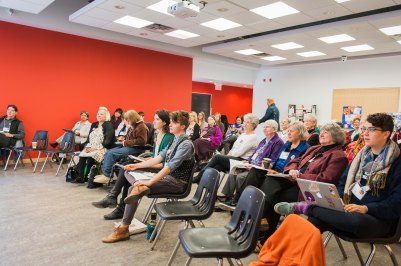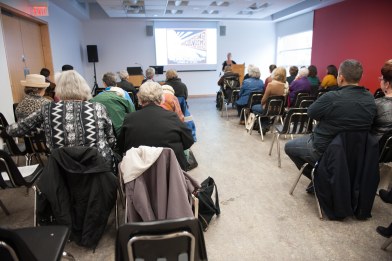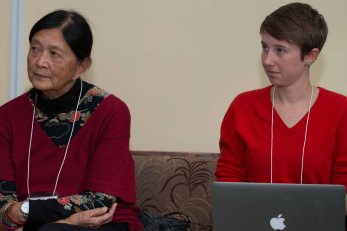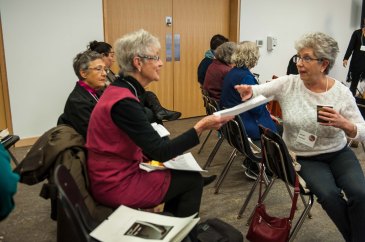BREAK-OUT GROUP REFLECTIONS
The small group conversations at the end of the day on Saturday offered terrific feedback on the symposium and reflections on what might come next. Below, we have pulled out some quotes and overarching themes that emerged from asking the questions: What stood out most from the symposium? What would you like to see come out of the symposium?
What stood out most from the symposium?
In your words:
- “I met so many likeminded friends. Typically as you grow older, you lose friends and you lose networks. But remarkably I feel that my network is growing. We need more opportunities like this.”
- “I keep coming back to this word – transformational. We are changing things, changing ourselves, by figuring it out together. By sharing our stories.”
- “Our stories were legitimized. So often at these kinds of events, stories are included at the end of the program, but never really a central part, often lost. But here the sharing of stories was a real central part of the meeting, and that legitimized our stories.”
- “The importance to stories, organizational and individual. We need spaces to continue to share our struggles, personal and collective.”
- “Hearing from Shirley Williams and Liz Stone, and Jean Koning who has extensive experience with First Nations groups as an ally, was a highlight. Their perspectives are so valued.”
- “Jean started by thinking her opinions were outside the scope of what we are talking about; her orientation as thinking about First Peoples, her relationships and responsibilities to First Peoples as a white settler women. But by the end, it is clear that the decolonization of knowledge is at the core of what we are talking about.”
- “I am envious of the freedom that older women feel to be able to be activists. You are not afraid. I need to be careful of what I do because my work depends on funds from the federal government.”
- “I did a lot of listening today… In my life, I have had almost no intergenerational relationships with other women outside of the scripted relations of mother/daughter, teacher/student, etc. So the intergenerational space feels so valuable.”
Themes:
The connections made, the open and dynamic conversation, the welcoming space, the sense of belonging, the fun.
Some feedback that came up repeatedly in the breakout sessions had to do with how this symposium created a space that was generous, welcoming, affirming, and inclusive. Many said that, in their lives, they often feel they don’t quite belong, or they are not sure where they belong. In this space, many remarked that they felt genuine connection and belonging. This belonging and connection, being face to face with other older women activists across difference, helped to remind people where they belong in the world; it broke the isolation, the invisibility, and the silence. Some went as far as to describe this experience as “transformational.” The importance of song/ dance, fun (the cabaret), small group discussions, and the roundtable format were highlighted.
The power and importance of stories and archives.
For many people, what stood out most was the power of sharing their own stories and hearing other women’s stories. This was very legitimizing and affirming, even healing. Many also felt that the discussions about archiving were extremely valuable, and that more thought must be given to how to collect and preserve both individual stories and collective stories; the stories of women’s lives and the stories of our organizations and movements.
Grappling with difference, privilege, decolonization, and language.
Every breakout group touched on how important it was that the symposium brought together a diversity of experiences and perspectives on aging and activism, and especially that it included some Indigenous perspectives. There was also the sense that we need more conversations of this kind, to begin to look at aging and activism from multiple perspectives, especially including the perspectives of First Peoples. Some felt that the symposium had made visible the way that even the words and language we use, for example “activism,” may not resonate across different knowledge systems. The concept of “resistance” was also considered. Building this understanding, and these key relationships, was seen not only as key to reconciliation but also as generating richer and more valuable understandings of aging and social change. Some emerging questions included: What are the different ways we act out activism (without calling it “activism”), what is it in different communities, what can it do, in terms of healing and creating change? What are the relationships between mental health, trauma, oppression, and different ways of doing activism? How can we understand our privilege and use it for good? How can we come together, across different knowledge systems, in discussion of aging and activism? How can we decolonize knowledge about aging and activism?
Intergenerationality.
The importance of having opportunities to speak and learn across generations was also highlighted in every group, as was the need for more such opportunities. Several younger participants came to a much firmer understanding of how activism is not only done by youth but is acted out all across people’s lives. Several conversations centered around how activism can change and morph across the lifecourse in relation to aging: the idea, for example, that aging can “free people up” to do more activism and to take more social risks, because they would no longer be putting their jobs or their families at risk. Thinking about older age as a time when people can more fully engage with social change work also challenges ideas of “the grey tsunami” – instead of thinking of older people a burden to society, we should be looking at their major contributors to social justice.
What would you like to see come out of the symposium?
These discussion revealed a desire for: (1) more opportunities to meet and gather face-to-face; (2) something tangible like a book on aging and activism, with stories and personal reflections included; and (3) various multi-media projects that would record what happened at the symposium and offer opportunities for ongoing sharing.
The following is a compiled list of responses to this question across the breakout groups:
- Some kind of report/ living record of what happened at the symposium, so that we can have access to this. A blogsite, online report, or hard copy report would work.
- A book, with academic pieces AND stories. Hardcover!
- Films, videos, podcasts; ongoing means of sharing our stories, both of our collective movements and our individual stories. A website. A listserve. Updates on what different people are doing. A Facebook group?
- We want to meet again. Face-to-face embodied interactions are so important; websites and books cannot get at the emotion we experiences here. Aging Activisms 2! Getting together regularly, in smaller groups, in our own communities.
- A curriculum or pedagogical report on how to create this kind of space, for use in classrooms and conferences.
WHAT’S NEXT? (As of October 29th)
Here we are only two weeks after Aging Activisms, and the energy is still high. Over the next two weeks, we plan to meet and speak with a number of people in order to more concretely plan out our next steps. In the meantime, here are the ideas we are exploring:
- To keep this website going and continue to update it with materials. We will continue to send around occasional emails to keep you in the loop and we promise a listserve in the near future as well.
- A book proposal. We have an interested publisher (Between the Lines Press) and are in the process of thinking through this project with a number of participants. Please stay tuned – we will share something more concrete very soon.
- Some face-to-face workshops in different locations, to bring smaller groups of us together, perhaps around the project of creating media pieces for the website (podcasts, digital stories, other?). Again, these are early days, but very exciting! Ideas are most welcome.
- Aging Activisms 2. Clearly, this needs to happen! When? Where? How? We are working on this and invite all ideas.
More to come for “What’s Next”… stay tuned!






